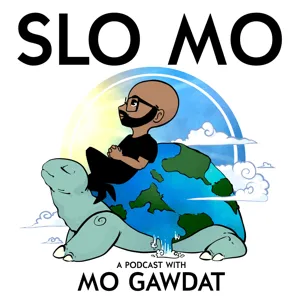Podcast Summary
Invest in personal growth beyond superficial self-care: Join Cara Lowenthal's affordable 5-day challenge to learn self-trust, strong decision-making, and break free from validation-seeking tendencies.
Self-care goes beyond superficial grooming and requires learning to change limiting thought patterns instilled by patriarchy. Cara Lowenthal, the host of Unfuck Your Brain podcast, emphasizes the importance of this practice, particularly in stopping the constant second-guessing that holds women back. She invites listeners to join her affordable and accessible 5-day challenge, "Stop Second-Guessing Yourself," happening April 17th-21st. Through this challenge, participants will learn to trust themselves, make strong decisions, and break free from validation-seeking and people-pleasing tendencies. This challenge offers a valuable opportunity to invest in personal growth and move past societal expectations.
Empowering Self-Care through Knowledge and Community: Dr. Pooja Lakshman, a psychiatrist specializing in women's mental health, encourages high-achieving individuals to seek help and resources to overcome self-doubt and provides accessible mental health education and advocacy through her work.
Self-care is not just about following trends or paying for external validation, but rather about addressing the root causes of self-doubt and empowering oneself through knowledge and community. Dr. Pooja Lakshman, a psychiatrist specializing in women's mental health, emphasizes the importance of mental health education and advocacy. She encourages women, especially high-achieving, perfectionistic individuals, to seek help and resources to overcome struggles with second-guessing themselves. Through her work as a psychiatrist, writer for the New York Times, founder of Gemma, and author of "Real Self Care," Dr. Lakshman aims to provide accessible mental health resources and challenge the narrative that self-care equates to expensive beauty rituals or trendy practices. To join a free coaching session with Dr. Lakshman, text your email address to +1347 997-1784 or visit unfuckyourbrain.com/trust.
Understanding the internal process of self-care: Self-care is an ongoing internal decision-making process, not a one-time event. Four principles help identify unique self-care definitions and empower choices.
Self-care is not just about reacting to stress with external methods like massages or escapes, but rather an internal decision-making process that guides us in making big choices about how we spend our time and energy throughout our lives. Real self-care is proactive and applies to every season, not a one-time event. It's essential to understand this distinction to build resiliency and avoid creating a cycle of burnout and self-care. In the book, the author shares four principles to help individuals identify their unique definition of real self-care and make empowered choices for their lives.
Self-care alone won't bring systemic change: Self-care is important but not enough, we need to address systemic issues like unequal pay and long work hours to bring about real change.
Self-care, while important, is not enough to bring about systemic change. Self-care, such as massages or wellness retreats, can be seen as Band-Aids that keep us in the same cycle without addressing the root causes of our stress and burnout. These root causes often stem from systemic issues like unequal pay, lack of access to childcare, and long work hours. Furthermore, women are socialized to feel guilty for using their time and money for themselves, making self-care a difficult concept to fully embrace. Instead, we need to take ownership of our choices and prioritize what's important to us, even if it means making hard decisions in our relationships or personal lives. By recognizing the interplay between individual and systemic issues, we can work towards true change.
Personal empowerment and self-care interconnected with systemic change: Self-care is unique to each person and requires long-term commitment, addressing both personal and systemic issues for meaningful change.
Personal empowerment and self-care are interconnected with addressing systemic issues. The speaker's personal experience of burnout and disillusionment with the medical system led her to question the status quo and seek change. However, she realized that setting one's life on fire through dramatic changes doesn't actually fix the problem. Instead, sustainable change requires hard work and a long-term commitment. Furthermore, commercial solutions to wellness and self-care have limited impact on larger systems. True self-care can lead to meaningful change, such as a husband taking paternity leave, which then impacts his workplace and beyond. The speaker emphasizes that each person's self-care journey is unique and cannot be prescribed with a set of rules or quick fixes. Instead, it requires a deep understanding of one's values and a commitment to addressing both personal and systemic issues.
Thinking differently and taking action in personal growth leads to change: Historically, individuals who brought about social change did so through personal growth and self-help, showing its importance for all people
Personal growth and self-help are powerful tools for creating change not only in our own lives but also in our families, workplaces, and broader social systems. The idea that self-help is only for privileged or self-absorbed individuals misunderstands its true purpose. Throughout history, individuals who have challenged the status quo and brought about social change have done so by thinking differently and taking action in their own lives. Whether it's burning down your old life or making a less dramatic change, the work required is the same. The personal development movement and social justice work are interconnected, and every person has the power to make a difference by focusing on their own self-care and self-preservation.
Real self-care for marginalized individuals: Boundaries, self-compassion, community, uplifting others essential for self-care. Privileged individuals should use their power to support those facing challenges.
Self-care is essential for everyone, regardless of the scope of change they aim for, but it can be particularly challenging for marginalized individuals due to societal pressures and lack of support. Real self-care involves setting boundaries, practicing self-compassion, seeking community, and using power to uplift others. For those with privilege, it's crucial to recognize and use it to support those who face more challenges. Ultimately, the journey to real self-care is a personal one, requiring discernment and a commitment to prioritizing one's well-being.
The power of self-efficacy to overcome learned helplessness: Recognize limiting beliefs, build self-efficacy, and take practical steps for personal growth to overcome learned helplessness and promote optimism and agency.
Society can instill a sense of learned helplessness and cynicism, making individuals believe that their current situation is the best or only option available. This mindset, often rooted in internalized oppression and privilege, can limit personal growth and prevent individuals from taking risks or making changes. However, it's essential to recognize that not all situations are equal, and some people have more resources to mitigate risks. Self-efficacy, or the belief in one's ability to influence events that affect their lives, can help counteract this mindset and promote optimism and agency. Practical applications, like managing money or protecting sleep, can contribute to self-care and overall well-being.
Setting boundaries and dealing with guilt: The first principle of real self-care: Recognize the importance of self-care, overcome internalized stigma, and prioritize personal growth and well-being by setting boundaries and dealing with guilt
Prioritizing self-care, including seeking help for mental health, is often overlooked in favor of external investments, despite its long-term benefits. Women, in particular, may struggle with the internalized stigma of valuing their own well-being and may feel guilty about spending money on themselves. The concept of martyrdom can be compelling, leading to neglect of personal needs. The cultural devaluation of internal work contributes to this issue, making it difficult for individuals to justify investing in their mental health. The first principle of real self-care is setting boundaries and dealing with guilt. It's essential to recognize the importance of self-care and overcome the internalized stigma to prioritize personal growth and well-being. To learn more about this and the other principles of real self-care, check out [Author's Name]'s book [Book Title].
Setting boundaries involves deciding, dealing with guilt, and getting clear on values: Setting boundaries means taking a pause, deciding, dealing with guilt, and trusting our values for confident decision making
Boundaries are essential in decision making, and they are not just about saying no. They are about taking a pause, deciding, and dealing with the guilt that comes with it. According to Puja, boundaries are like a "volume dial" for the guilt, which is an internalized response to external pressures. The next step is self-compassion, which involves changing our relationship with our thoughts and feelings, rather than trying to eliminate them completely. The third principle is getting clear on your values, which can be a challenging process for many people, as they have likely never taken the time to articulate what they truly care about. By identifying and trusting our values, we can make more confident decisions and trust ourselves.
Living by your values for self-care and personal growth: Identifying and applying values leads to positive changes, control over what we can influence, and asking for needs in relationships. Change comes from daily actions, not one dramatic decision.
Discovering and living by your values is essential for self-care and personal growth. Values are the adjectives and adverbs that guide our decisions and actions. Understanding and applying them in our lives gives us power to make positive changes, even if they seem small and mundane at first. The process of identifying and living by our values is about taking control of what we can influence, and asking for what we need in our relationships. It's important to remember that there's no one right way to do things, and that change often comes from small, daily actions rather than one dramatic decision. The book "Real Self Care" by the speaker, offers guidance on this journey and is available in various formats including audiobook, where the author narrates it herself.
Overcoming Self-Doubt and Second-Guessing: Join Pooja's 'Stop Second-Guessing Yourself Challenge' from April 17th-21st to learn techniques for addressing self-doubt and build a supportive community.
Self-care is not just about pampering yourself with luxurious products or activities, but also involves working on your inner thoughts and emotions. Pooja Lakshman, a self-care expert and founder of Gemma Women, emphasized the importance of addressing self-doubt and second-guessing, which can hinder our ability to make decisions and trust ourselves. She will be leading a "Stop Second-Guessing Yourself Challenge" from April 17th to 21st, where participants can learn how to overcome these patterns and build a supportive community. To join, text "trust" to +1347-977-1784 and sign up at wegottachange.com/trust. Follow Pooja on Instagram @poojalakshman for more self-care tips and resources. Don't miss this opportunity to connect with like-minded individuals and transform your relationship with yourself.






